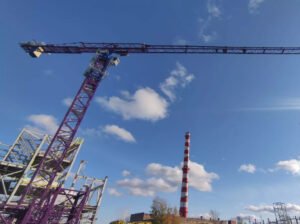Brakes for Tower Cranes: Electromagnetic vs. Hydraulic Brakes
Let’s delve into the features of two commonly used braking systems in tower cranes: electromagnetic brakes and hydraulic brakes.
Electromagnetic Brakes
1. Working Principle:
- Electromagnetic Principle: Electromagnetic brakes operate through the use of an electromagnet to generate braking force. When current flows through the electromagnet, it creates a magnetic field that attracts the movable part of the brake, causing it to contact the fixed part, thereby generating friction and producing the braking effect.
- Normally Open or Closed: Electromagnetic brakes are usually normally closed, meaning the brake is engaged when no current is applied, ensuring the equipment remains secure in the event of a power failure.
2. Advantages:
- Fast Response: Electromagnetic brakes have a very short response time, allowing them to activate or release quickly.
- Easy Maintenance: Due to their relatively simple structure, electromagnetic brakes are easy to maintain and service.
- Compact and Lightweight: They are suitable for applications where space is limited.
- Power Failure Protection: In case of a power outage, electromagnetic brakes automatically engage, enhancing the safety of the equipment.
3. Disadvantages:
- Dependent on Power Supply: Electromagnetic brakes rely on a power source, and their performance may be affected by power fluctuations or failures.
- Limited Braking Force: Compared to hydraulic brakes, electromagnetic brakes provide less braking force, making them unsuitable for applications requiring very high braking power.
- Heat Generation: Prolonged use may cause the electromagnetic coil to heat up, potentially affecting the brake’s performance and lifespan.
Hydraulic Brakes
1. Working Principle:
- Hydraulic Principle: Hydraulic brakes use a hydraulic pump and hydraulic fluid to transmit pressure, converting fluid pressure into mechanical force. This force pushes the brake pads to clamp down on the brake disc, achieving braking.
- Pressure Control: The braking force can be precisely controlled by adjusting the hydraulic pressure, making it adaptable to different workloads.
2. Advantages:
- High Braking Force: Hydraulic brakes can generate very strong braking forces, making them ideal for large and heavy-load tower cranes.
- Precise Control: Hydraulic systems allow for precise control of braking force, which is crucial in applications requiring high precision.
- High Stability: Hydraulic brakes maintain stable performance over long periods and are less affected by external factors such as temperature variations.
- Reliability in Long-Term Use: Hydraulic systems are designed to meet the demands of prolonged operation, offering high reliability and durability.
3. Disadvantages:
- Complexity and Maintenance: Hydraulic brake systems are more complex, involving multiple components like hydraulic pumps, pipes, and reservoirs, making maintenance more challenging and costly.
- Larger Size and Weight: Hydraulic brakes are typically larger and heavier than electromagnetic brakes, making them less suitable for applications with strict space and weight constraints.
- Leakage Risk: Hydraulic systems carry the risk of hydraulic fluid leaks, which could lead to environmental pollution or equipment damage.
Conclusion
- Electromagnetic brakes are suitable for tower cranes that require quick response and compact design, particularly where automatic locking is necessary in case of a power failure.
- Hydraulic brakes, on the other hand, are better suited for large or heavy-load tower cranes that require strong braking force and precise control. While they involve more complex maintenance and are bulkier, their stability and durability make them the preferred choice in demanding applications.
Each brake system has its own set of pros and cons, and the choice between them should be based on the specific application scenario, load requirements, and maintenance capabilities of the tower crane. I hope this explanation helps you better understand the characteristics of tower crane braking systems!






